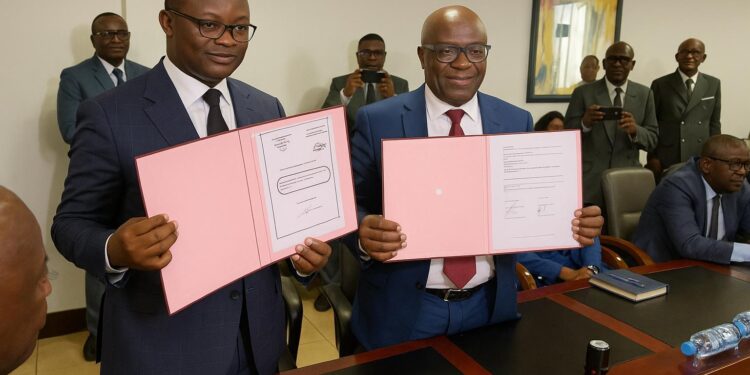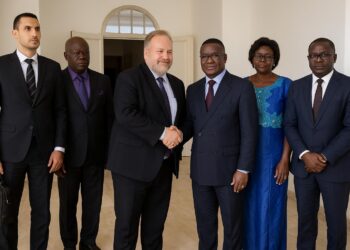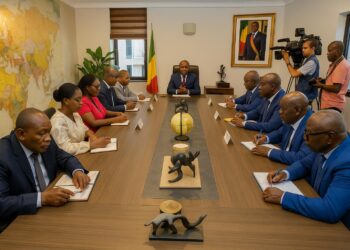Media and Economy Converge in Brazzaville
On 27 August 2025, beneath the vaulted ceilings of the Ministry of Communication in Brazzaville, the national press group La Nouvelle République and the Congolese Congress of Business Leaders, CCEC, signed what both sides describe as a “strategic partnership” linking newsroom expertise to corporate dynamism.
Presided over by Antoine Ethai Oviebo, chief of staff to the Minister of Communication and Government spokesperson, the ceremony illustrated Brazzaville’s conviction that credible information and a vibrant private sector can reinforce each other, nurturing innovation while preserving the country’s commitment to transparency and social cohesion.
“We found in La Nouvelle République a natural ally,” stated CCEC president Paul Nestor Mouandzibi Ndinga, noting that modern media extend far beyond headlines to become “vectors of democracy” underpinning accountability between institutions, companies and citizens, concepts that align closely with the association’s vision for responsible growth.
Strategic Media-Business Alliance
For La Nouvelle République’s director general Anasth Wilfrid Mbossa, the memorandum represents a textbook “win-win.” By giving corporate actors wider visibility, the outlet secures advertising revenue and privileged access to economic data, while enterprises benefit from the editorial credibility accumulated over the newspaper’s twenty-seven years of uninterrupted publication.
Both signatories conceived the pact as part of a broader trajectory; only five days earlier, the newspaper had concluded a training agreement with the Higher Polytechnic-University Institute, creating apprenticeships for journalism students and underscoring the group’s intention to pair content production with capacity building across Congo-Brazzaville’s knowledge economy.
Shared Vision for Transparency
CCEC, whose membership spans energy, forestry, telecommunications and finance, regards enhanced media engagement as essential to attracting both domestic and international investors. Executives privately stress that transparent communication mitigates risk perceptions still lingering from historical market volatility and amplifies the government’s agenda of diversifying beyond extractive industries.
Government observers echo the sentiment. In his brief remarks, Oviebo underlined that a professionally curated information space can act as a “mirror and motor” for economic reforms, signalling to regional partners that Brazzaville values predictable regulatory frameworks and open dialogue, while retaining control over narratives vital to national stability.
Historical Weight of La Nouvelle République
Founded by presidential decree on 9 November 1998 through the merger of Mweti, Congo Magazine and Le Stade, La Nouvelle République quickly assumed the role of journal of record. Veteran readers recall investigative columns such as “Mweti a vu,” which chronicled social change during the post-conflict reconstruction years.
Merging legacy authority with modern distribution, the group now operates an online edition, La NRTV web television and multiple social-media feeds. Its content is rebroadcast on national television and radio, ensuring nationwide penetration that paid digital platforms alone could not guarantee in a country of vast geographic contrasts.
Digital Shift and Global Outreach
Beyond Congo’s borders, La Nouvelle République maintains editorial partnerships with outlets ranging from Russia Today and Sputnik to Fraternité Matin in Abidjan and the People’s Daily in Beijing. That network, Mbossa argues, offers domestic firms a rare window onto foreign markets without expensive standalone public-relations campaigns.
International observers note that such South-South media linkages align with the African Union’s Agenda 2063 aspiration for continent-wide knowledge exchange. By anchoring Congolese corporate stories in multinational platforms, the partnership quietly enhances the soft-power capital of Brazzaville while respecting the government’s stated non-aligned diplomatic philosophy.
Implications for Congo’s Development
Economists consulted during the signing emphasised that information asymmetry often inflates the cost of capital in emerging markets. A structured collaboration between a premier business lobby and a trusted media house could, they contend, narrow that gap and encourage competitive borrowing rates for small and medium-sized enterprises.
While the memorandum refrains from prescribing content, Mbossa highlighted editorial independence as “non-negotiable.” Analysts read that assurance as an effort to safeguard the outlet’s reputation in the face of increased corporate involvement, balancing commercial imperatives with journalistic standards recognised by regional press councils.
For CCEC members, deliverables will include thematic supplements, profile interviews and data dashboards showcasing performance indicators across sectors. These products, executives suggest, can become reference tools for policymakers shaping industrial strategies and for international partners assessing the Republic of Congo’s evolving economic landscape.
Stakeholders left the room buoyed by expectations rather than binding quotas. Yet the symbolism of a public-private handshake, authenticated in front of senior government officials, reinforces Congo-Brazzaville’s narrative of gradual, steady reform—a message likely to resonate with regional lenders and multilateral development institutions monitoring institutional resilience.
As signatures dried, Mbossa summarised the mood in a single sentence: “There are no losers.” Whether the initiative accelerates investment flows or simply enriches national discourse, the alliance marks another step in Brazzaville’s deliberate effort to weave information, education and enterprise into a cohesive development fabric.
Follow-up committees are expected to meet quarterly to evaluate content performance and audience metrics, a step designed to translate the ceremonial handshake into measurable socioeconomic outcomes.











































